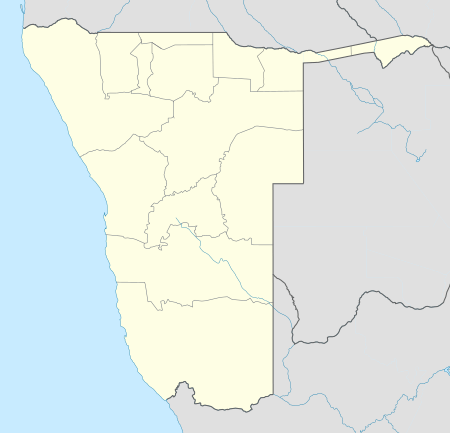Usakos
Usakos (Damara: grab the heel,[2] Otjiherero name: Okanduu[3]) is a town on the banks of river Khan, 140 kilometres north-east of Swakopmund in the Erongo Region of Namibia. It is located on the B2 (Trans-Kalahari Highway), the main road between the Walvis Bay and Johannesburg. The town has 3,000 inhabitants and owns 58 square kilometres (22 sq mi) of land.[4]
Usakos Okanduu | |
|---|---|
.jpg) Aerial photograph of Usakos (2018) | |
 Seal | |
| Motto(s): | |
 Usakos Location in Namibia | |
| Coordinates: 22°0′S 15°36′E | |
| Country | |
| Region | Erongo Region |
| Constituency | Karibib Constituency |
| Established | 1900s |
| Population (2011)[1] | |
| • Total | 3,583 |
| Time zone | UTC+1 (South African Standard Time) |
| Climate | BWh |


Surrounded by mountains, Usakos is quite picturesque. Certain spots around the town show the longest uninterrupted horizon in the world.[2] It is the closest town to the Spitzkoppe, often referred to as the "Matterhorn of Namibia".[5]
History
The settlement was founded in the early 1900s as a workshop and watering station for locomotives. Herero chief Samuel Maharero sold the land to Europeans who resold it in 1903 to the Otavi Minen- und Eisenbahngesellschaft (Otavi Mining and Railway Company) (OMEG) which operated an industrial railway line from Swakopmund to Tsumeb. OMEG established a railway station and a repair shop which was used until the 1960s. When mining operations slowed down, Usakos' importance faded quickly. Today it is just a drive-through from the Namibian inland to the coast.[5]
Historic buildings and structures in Usakos are the Roman Catholic church (erected 1905), the now dilapidated railway station building, and the old hotel.[5]
Development and infrastructure
Usakos is riddled with poverty and alcohol abuse, the current unemployment rate is around 60%. Unlike other Namibian towns, it has not seen substantial development since independence in 1990.[6]
Usakos Railway Station connects the town to the Namibian railway network.
Politics
Usakos was downgraded from municipal to town status in 2010.[7] It is now governed by a town council that has seven seats.[8]
In the 2010 local authority election, a total of 1,029 votes were cast in the city. SWAPO won with approximately 47% of the vote. Of the three other parties seeking votes in the election, United Democratic Front (UDF) received approximately 31% of the vote, followed by RDP (17%) and COD (4%).[9] SWAPO also won the 2015 local authority elections, gaining four seats (513 votes). Two seats went to the UDF (295 votes), and the remaining one to the Democratic Turnhalle Alliance (DTA, 76 votes).[10]
Notable residents
Usakos is the hometown of the following prominent politicians:[6]
- Michael Goreseb, member of the National Assembly of Namibia
- Theo-Ben Gurirab Speaker of the National Assembly
- Tsudao Gurirab, Member of Parliament from 1999 to 2009
- Alpheus ǃNaruseb, Minister of Land and Resettlement
See also
References
| Wikimedia Commons has media related to Usakos. |
- "Table 4.2.2 Urban population by Census years (2001 and 2011)" (PDF). Namibia 2011 - Population and Housing Census Main Report. Namibia Statistics Agency. p. 39. Retrieved 24 August 2016.
- Henckert, Wolfgang (17 September 2009). "Usakos". Henckert Tourist Centre. Archived from the original on 11 July 2011. Retrieved 22 November 2010.
- Menges, Werner (12 May 2005). "Windhoek?! Rather make that Otjomuise". The Namibian.
- "ELECTIONS 2010: Erongo regional profile". New Era. 16 November 2010.
- von Schmettau, Konny (28 February 2013). "Usakos-Kurze Blüte, schneller Fall" [Usakos-Short Rise, Fast Fall]. Allgemeine Zeitung (in German). Tourismus Namibia monthly supplement. p. 9.
- Ihuhua, Corry (12 September 2012). "Unemployment rips Usakos apart". Namibian Sun.
- Hartman, Adam (27 August 2010). "Town regrading a 'sad move'". The Namibian. Archived from the original on 11 December 2012. Retrieved 27 August 2010.
- "Know Your Local Authority". Election Watch (3). Institute for Public Policy Research. 2015. p. 4.
- Local Authority Election Results for Usakos
- "Local elections results". Electoral Commission of Namibia. 28 November 2015. p. 1. Archived from the original on 10 December 2015. Retrieved 8 December 2015.